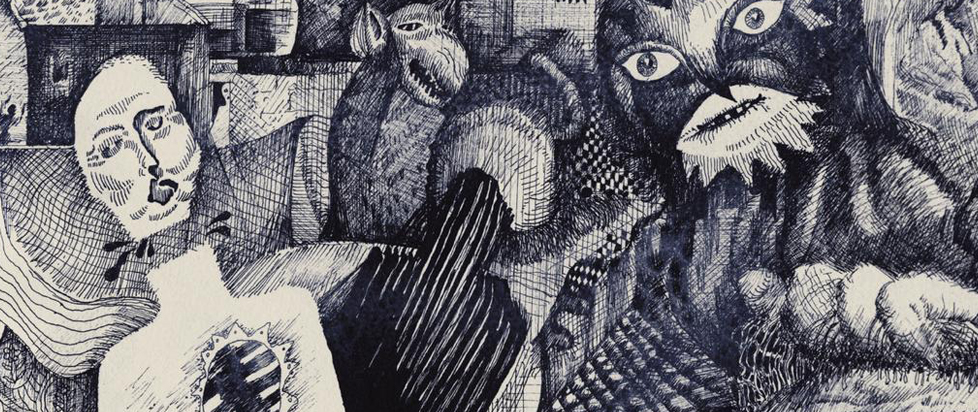
Good & Evil Issue – Thoughts Recap
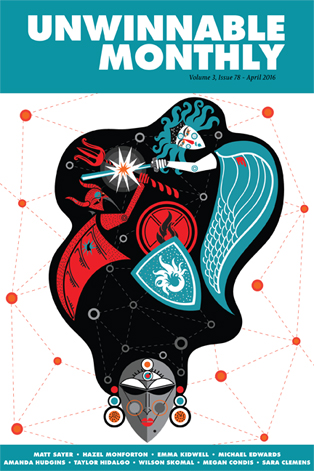 Ahoy, welcome back aboard the good ship Unwinnable! This month, our regular crew of columnists delivers their eclectic assortment of essay excerpts for your eyeballs, from Twilight Zone to the best metal releases of the previous month to the super goodness of Superhot. We would like to draw your attention in particular to Andrea Ayres’ exploration of crunch development and Adam Boffa’s reexamination of Breaking Bad.
Ahoy, welcome back aboard the good ship Unwinnable! This month, our regular crew of columnists delivers their eclectic assortment of essay excerpts for your eyeballs, from Twilight Zone to the best metal releases of the previous month to the super goodness of Superhot. We would like to draw your attention in particular to Andrea Ayres’ exploration of crunch development and Adam Boffa’s reexamination of Breaking Bad.
In addition to these stories, this month’s Thoughts section includes a Bestiary entry on the Sphinx, a profile of last month’s cover artist Scott Wygmans and our usual lists of recommended books, games and music,
As always, if you dig what you read, buy the issue or consider subscribing. Unwinnable keeps going thanks to your generous support.
Rookie of the Year, by Matt Marrone
Matt discovers some corners of The Twilight Zone he never realized existed.
Some surprisingly new-to-me episodes have been fantastic. Some seem vaguely familiar, or even wholly so, though I’d long ago forgotten the endings, while others are completely fresh.
Amusingly, some use the same sets as other episodes; I’m fairly certain there is a hallway and staircase that serves as a Hollywood mansion (in “The Sixteen Millimeter Shrine”), an army base (in “The Purple Testament”) and a city hall (in “Elegy”). Some episodes are terrifying (“Nightmare as a Child”), have a great payoff (“I Shot an Arrow into the Air”), and a few are more comical or campy than I’d remembered or expected from the series (“The Fever”). And some of the episodes, the very best of them, are pure poetry.
Backlog, by Gavin Craig
Gavin studies the elements of Ni No Kuni: Wrath of the White Witch.
That is to say that magic in Howl’s Moving Castle comes from a person’s heart (or arranged lack thereof) rather than books, and while this makes for efficient storytelling in a feature film, it might be a bit unsatisfying in a
menu-heavy, stats-and-numbers RPG. Adding to Oliver’s spellbook one page at a time might be more Hogwarts than Howl, but this isn’t entirely a bad thing. Intuition can make for great storytelling, but it’s hit-or-miss when you’re building a user interface or designing a fair, comprehensible and rewarding in-game combat system
HUD, by Andrea Ayres
Andrea is feeling the crunch this spring.
A while ago, I came across the pledge “Crunch is Failure” by Tanya X. Short. Short is the
Director of Kitfox Games and longtime critic of the industry’s reliance on crunch. The pledge calls upon those employed by the games industry to cease the practice of excessive overtime, to acknowledge that it is a form of failure and to work together to end the practice. I recently interviewed her over email to ask her a few questions about her pledge and why she believes the game industry has been so reluctant to change.
Battle Jacket, by Casey Lynch
There’s more metal than free time for most, so Casey laid out the best albums this month.
METAL ALBUM OF THE MONTH: The
Zenith Passage – Solipsist
Do you like hyper-technical progressive death metal like The Faceless and Between the Buried and Me? Let me introduce you to your new metal crush, The Zenith Passage. Their 2013 debut LP Cosmic Dissonance brought them instant recognition in the progressive underground. Solipsist delivers more crystalline production, surgically precise arrangements, and scorching virtuosity and they’re strangely more palatable than ever.
Here’s the Thing, by Rob Rich
Rob is quantifying fun with dollars.
Let’s get back to the issue at hand – time. Some games can be completed in less than an
hour. Some will take around 10 or so. Others can be upwards of 40. Then there are games that go up into the hundreds of hours. While it might seem like a 100+ hour game is the obvious choice when it comes to value, it omits one extremely crucial bit of information: whether or not you’ll actually enjoy playing it.It seems silly, but I think it bears pointing out anyway. Whether or not you enjoy a game is far more important than how long it will keep you busy
No Accounting for Taste, by Adam Boffa
Adam is saying goodbye to Mr. Chips and hello to Scarface
While Walt’s behavior in this season reaches staggering lows, the show uses this new cast of characters to perform a bit of sympathetic
misdirection. By putting these miserable people at center stage and gradually adding to their list of victims and crimes, Breaking Bad places a clear and undeniable villain in front of Walt where previously there had been no such clarity. The audience can, if they want, choose to overlook the moral crisis of reckoning with Walter White in favor of focusing on the elimination of the greater threat. The show’s ambiguity is placed just a little lower on the priority list as a more overt battle between two forces begins. Walt is certainly not the ideal hero to be rooting for, but the show makes clear that he is the preferable option of the parties in motion.
Throwing the First Brick, by Mitch Bowman
Mitch is appreciating the value of a Warped Tour band.
I still remember the first time I heard them and I realized that I actually gave a shit about
their music, which was a new experience for me. It was 2003, I was in grade 10 art class; Saosin’s first EP, Translating the Name, has just come out, and my friend/classmate had it on his off-brand mp3 player. He made me listen to it, despite my complete lack of interest in music at that time, and it’s not hyperbole to say that it changed the trajectory of the rest of my life.
The Player’s Soul, by Richard Clark
Richard is setting his own goals.
Most open world games have something called a waypoint, a marker the player places on a map. Typically represented by a dot or cross-
hairs, it represents the player’s momentary, proactive goal. Before we reach the waypoint, we are faced with a million little decisions that can all be paraphrased with one question: how important is that destination, anyway? Open worlds challenge us to think through this calculation and truly decide, is reaching this destination a need or a want? Is it urgent, or is it an eventual possibility? The Open World How “distracted” or “completist” we present ourselves within the open world depends largely on our answer to these questions. If we book it to the location (maybe we even fast-travel), then the destination was the whole point, but if we spend our time saving hostages, collecting feathers and exploring caves, then that watermark must not mean very much to us, right? In that case, the point must be the journey.
Artist Profile: Scott Wygmans
I think monsters are cool, as simple as it is. I was always the kid who liked the bad guys more than the good guys – always thought Cobra Commander was cooler than Duke, liked Venom way more than Spider-man, always played as orcs in the original Warcraft, always thought the monsters in any type of literature or entertainment were so much cooler looking than any of the heroes.
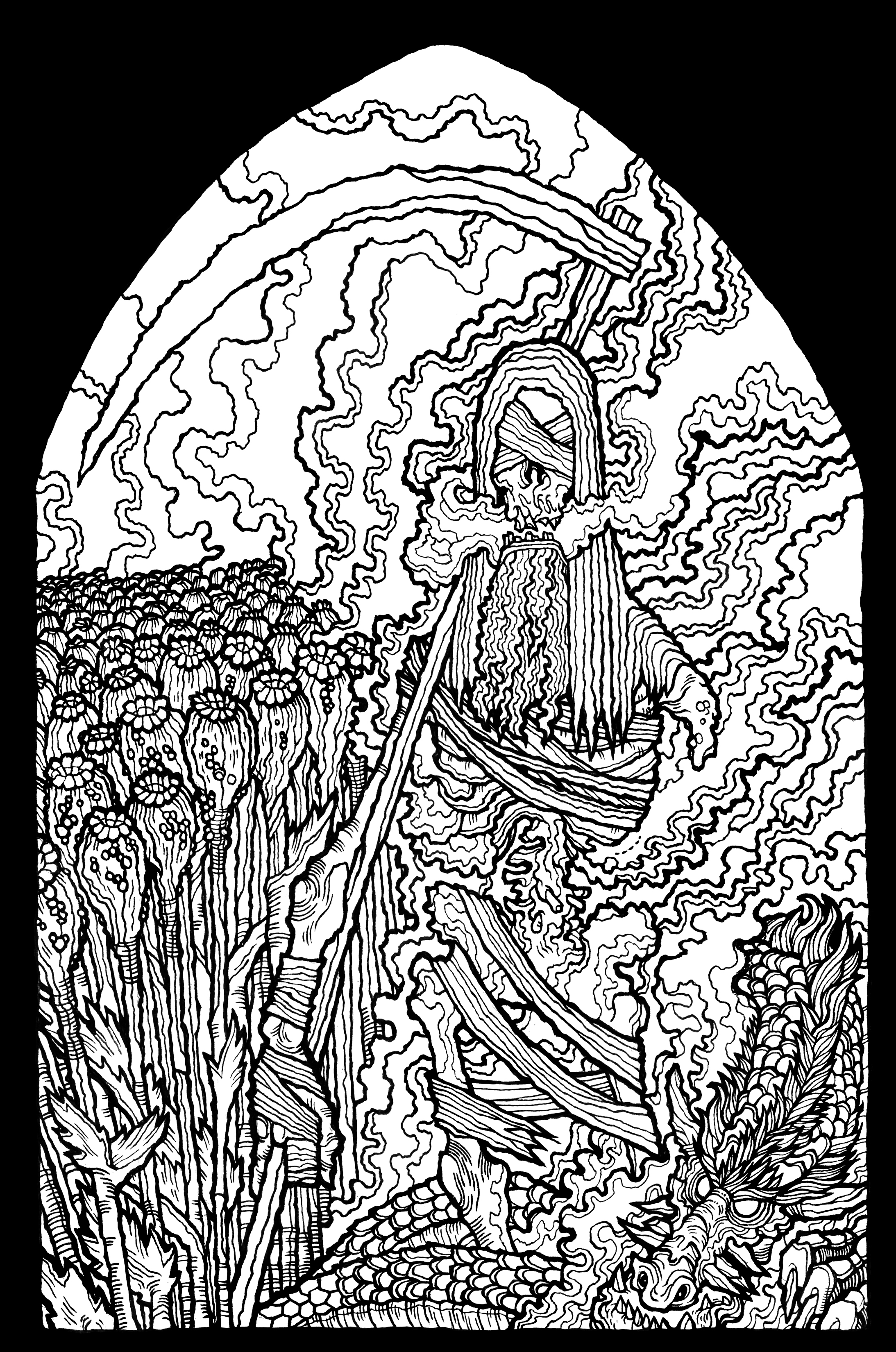
You’ve been reading an excerpt from Unwinnable Monthly Issue 78.
To read the article in its entirety, please purchase the issue from the shop or sign up for a subscription to Unwinnable Monthly!
 Amusingly, some use the same sets as other episodes; I’m fairly certain there is a hallway and staircase that serves as a Hollywood mansion (in “The Sixteen Millimeter Shrine”), an army base (in “The Purple Testament”) and a city hall (in “Elegy”). Some episodes are terrifying (“Nightmare as a Child”), have a great payoff (“I Shot an Arrow into the Air”), and a few are more comical or campy than I’d remembered or expected from the series (“The Fever”). And some of the episodes, the very best of them, are pure poetry.
Amusingly, some use the same sets as other episodes; I’m fairly certain there is a hallway and staircase that serves as a Hollywood mansion (in “The Sixteen Millimeter Shrine”), an army base (in “The Purple Testament”) and a city hall (in “Elegy”). Some episodes are terrifying (“Nightmare as a Child”), have a great payoff (“I Shot an Arrow into the Air”), and a few are more comical or campy than I’d remembered or expected from the series (“The Fever”). And some of the episodes, the very best of them, are pure poetry.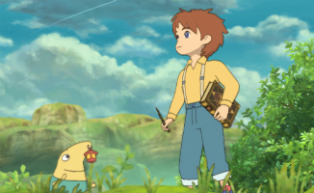 menu-heavy, stats-and-numbers RPG. Adding to Oliver’s spellbook one page at a time might be more Hogwarts than Howl, but this isn’t entirely a bad thing. Intuition can make for great storytelling, but it’s hit-or-miss when you’re building a user interface or designing a fair, comprehensible and rewarding in-game combat system
menu-heavy, stats-and-numbers RPG. Adding to Oliver’s spellbook one page at a time might be more Hogwarts than Howl, but this isn’t entirely a bad thing. Intuition can make for great storytelling, but it’s hit-or-miss when you’re building a user interface or designing a fair, comprehensible and rewarding in-game combat system Director of Kitfox Games and longtime critic of the industry’s reliance on crunch. The pledge calls upon those employed by the games industry to cease the practice of excessive overtime, to acknowledge that it is a form of failure and to work together to end the practice. I recently interviewed her over email to ask her a few questions about her pledge and why she believes the game industry has been so reluctant to change.
Director of Kitfox Games and longtime critic of the industry’s reliance on crunch. The pledge calls upon those employed by the games industry to cease the practice of excessive overtime, to acknowledge that it is a form of failure and to work together to end the practice. I recently interviewed her over email to ask her a few questions about her pledge and why she believes the game industry has been so reluctant to change. Zenith Passage – Solipsist
Zenith Passage – Solipsist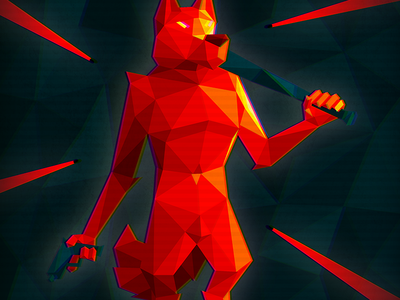 hour. Some will take around 10 or so. Others can be upwards of 40. Then there are games that go up into the hundreds of hours. While it might seem like a 100+ hour game is the obvious choice when it comes to value, it omits one extremely crucial bit of information: whether or not you’ll actually enjoy playing it.It seems silly, but I think it bears pointing out anyway. Whether or not you enjoy a game is far more important than how long it will keep you busy
hour. Some will take around 10 or so. Others can be upwards of 40. Then there are games that go up into the hundreds of hours. While it might seem like a 100+ hour game is the obvious choice when it comes to value, it omits one extremely crucial bit of information: whether or not you’ll actually enjoy playing it.It seems silly, but I think it bears pointing out anyway. Whether or not you enjoy a game is far more important than how long it will keep you busy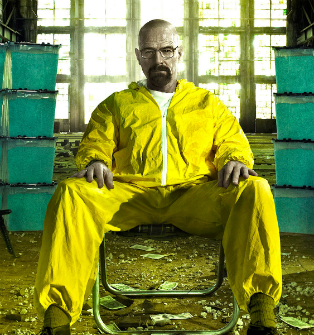 misdirection. By putting these miserable people at center stage and gradually adding to their list of victims and crimes, Breaking Bad places a clear and undeniable villain in front of Walt where previously there had been no such clarity. The audience can, if they want, choose to overlook the moral crisis of reckoning with Walter White in favor of focusing on the elimination of the greater threat. The show’s ambiguity is placed just a little lower on the priority list as a more overt battle between two forces begins. Walt is certainly not the ideal hero to be rooting for, but the show makes clear that he is the preferable option of the parties in motion.
misdirection. By putting these miserable people at center stage and gradually adding to their list of victims and crimes, Breaking Bad places a clear and undeniable villain in front of Walt where previously there had been no such clarity. The audience can, if they want, choose to overlook the moral crisis of reckoning with Walter White in favor of focusing on the elimination of the greater threat. The show’s ambiguity is placed just a little lower on the priority list as a more overt battle between two forces begins. Walt is certainly not the ideal hero to be rooting for, but the show makes clear that he is the preferable option of the parties in motion. their music, which was a new experience for me. It was 2003, I was in grade 10 art class; Saosin’s first EP, Translating the Name, has just come out, and my friend/classmate had it on his off-brand mp3 player. He made me listen to it, despite my complete lack of interest in music at that time, and it’s not hyperbole to say that it changed the trajectory of the rest of my life.
their music, which was a new experience for me. It was 2003, I was in grade 10 art class; Saosin’s first EP, Translating the Name, has just come out, and my friend/classmate had it on his off-brand mp3 player. He made me listen to it, despite my complete lack of interest in music at that time, and it’s not hyperbole to say that it changed the trajectory of the rest of my life. hairs, it represents the player’s momentary, proactive goal. Before we reach the waypoint, we are faced with a million little decisions that can all be paraphrased with one question: how important is that destination, anyway? Open worlds challenge us to think through this calculation and truly decide, is reaching this destination a need or a want? Is it urgent, or is it an eventual possibility? The Open World How “distracted” or “completist” we present ourselves within the open world depends largely on our answer to these questions. If we book it to the location (maybe we even fast-travel), then the destination was the whole point, but if we spend our time saving hostages, collecting feathers and exploring caves, then that watermark must not mean very much to us, right? In that case, the point must be the journey.
hairs, it represents the player’s momentary, proactive goal. Before we reach the waypoint, we are faced with a million little decisions that can all be paraphrased with one question: how important is that destination, anyway? Open worlds challenge us to think through this calculation and truly decide, is reaching this destination a need or a want? Is it urgent, or is it an eventual possibility? The Open World How “distracted” or “completist” we present ourselves within the open world depends largely on our answer to these questions. If we book it to the location (maybe we even fast-travel), then the destination was the whole point, but if we spend our time saving hostages, collecting feathers and exploring caves, then that watermark must not mean very much to us, right? In that case, the point must be the journey.



